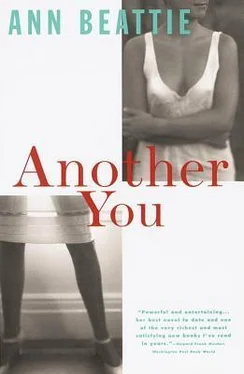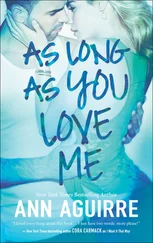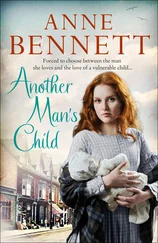Ann Beattie - Another You
Здесь есть возможность читать онлайн «Ann Beattie - Another You» весь текст электронной книги совершенно бесплатно (целиком полную версию без сокращений). В некоторых случаях можно слушать аудио, скачать через торрент в формате fb2 и присутствует краткое содержание. Год выпуска: 2014, Издательство: Vintage Books, Жанр: Современная проза, на английском языке. Описание произведения, (предисловие) а так же отзывы посетителей доступны на портале библиотеки ЛибКат.
- Название:Another You
- Автор:
- Издательство:Vintage Books
- Жанр:
- Год:2014
- ISBN:нет данных
- Рейтинг книги:5 / 5. Голосов: 1
-
Избранное:Добавить в избранное
- Отзывы:
-
Ваша оценка:
- 100
- 1
- 2
- 3
- 4
- 5
Another You: краткое содержание, описание и аннотация
Предлагаем к чтению аннотацию, описание, краткое содержание или предисловие (зависит от того, что написал сам автор книги «Another You»). Если вы не нашли необходимую информацию о книге — напишите в комментариях, мы постараемся отыскать её.
Another You — читать онлайн бесплатно полную книгу (весь текст) целиком
Ниже представлен текст книги, разбитый по страницам. Система сохранения места последней прочитанной страницы, позволяет с удобством читать онлайн бесплатно книгу «Another You», без необходимости каждый раз заново искать на чём Вы остановились. Поставьте закладку, и сможете в любой момент перейти на страницу, на которой закончили чтение.
Интервал:
Закладка:
Between McCallum’s ejecting one tape and plugging in another, the radio cut in with the theme from Midnight Cowboy , a movie that had greatly impressed Marshall when he’d first seen it. The song also immediately caught McCallum’s attention, though it was frizzed with static, as well as fading in and out as if they were driving through a series of invisible tunnels. Marshall could have done without hearing it; the song conjured up the movie’s ending — Ratso wearing his palm tree shirt, dead on the bus bound for Florida.
Florida was where the two of them were headed, after the stopover they would make first in the small town of Buena Vista, where McCallum, for reasons Marshall still could not comprehend, felt that he must, for once and for all, explain himself to Cheryl Lanier so that his soul might begin to heal along with his bodily wounds. McCallum had also tried to find out where Livan herself was, to no avail; if McCallum had been intent on contacting her, the best he could probably do would be to send a letter to Livan Baker, Planet Earth. To the extent he’d been involved with Cheryl himself, Marshall could hardly refuse to stop on their way to visit Gordon in the Keys. Though she hadn’t responded to the note he sent her along with the clipping about Livan Baker — vanished, it seemed; or at least, in a follow-up article in the paper, the U.S. government claimed to be interested in finding out her whereabouts — Cheryl had phoned McCallum in response to whatever letter he’d sent her.
The tape deck swallowed the next tape McCallum pushed in: Eddie Fisher, singing “I’m Yours.” It was quite possibly the worst song Marshall had ever heard. Eddie Fisher’s soaring tenor was vehement; it would have paralyzed the intended recipient of his affections as certainly as Kryptonite would bring Superman to a screeching halt. He had read that during Eddie Fisher’s brief marriage to Elizabeth Taylor, she had had him picked up from the piano bench aboard her yacht and thrown overboard. Marshall looked imploringly at McCallum, but his eyes were shut, his head dropped back on the headrest, a shit-eating grin on his tipped-up face. All he could hope was that it was a homemade tape and that next they might be treated to something less ridiculous. It turned out to be Kate Smith. Rolling along on the Beltway, as a pallid half-moon beamed through drifting clouds, surrounded by vanity license plates and cars that were either expensive and new or limping-along junkers, Marshall practiced patience by listening silently to McCallum’s hit parade.
“I love it,” McCallum said, keeping his eyes closed so that there was no indication he was talking to Marshall, rather than himself. “Here we are doing our update on the buddy film: would-be murder victim and concerned friend making a big circle around Slick Willy’s Washington, on their way to making amends and soaking up some Florida sunshine. ‘Greetings from sunny Florida,’ ” McCallum said. “Remember those postcards where you check one box in each category? ‘I am: Fine; Sunburned; Fatter; Lonely; Horny.’ ”
“ ‘Wish you were: Here with me; Farther away; Kissing me now; Back on Mars,’ ” Marshall said.
The events of the winter had been so extraordinary he might as well have been living on another planet, Marshall thought. He flipped down the visor to block the sun, a bright orange orb low in the sky, shining in his face. To keep pace with the traffic, he was going fifteen miles over the speed limit, checking signs for Route 29 South, not sure how soon the turn would come after taking the exit for Front Royal. McCallum, now apparently asleep, was sitting on the map, leaving only a small corner protruding. The man was a wonder: to be able to tune out Kate Smith’s heartfelt, booming voice; to not even squint in the blaze of sunlight. Then again, considering what he’d been through, such things were probably rather delightful. The night before, McCallum had slept with one of the bedside lamps on, lowered to the floor so it wouldn’t disturb Marshall. Wearing earphones, he had fallen asleep almost immediately, and in the barely darkened room, Marshall, unable to fall asleep quickly, had turned on his side and propped himself on one elbow to look at the odd spectacle that was McCallum: he slept wearing his socks and running shoes, though he’d stripped down to his Jockey shorts and thermal shirt before getting into bed. He could tell by the bright yellow butterfly on the cover of the cassette case on the floor that McCallum had fallen asleep listening to Brahms. Brahms’s “Lullabye” seeping smoothly into his unconscious, where the listener also retained images of a knife rising and falling, the memory of sudden pain. McCallum had not so much been shifting in sleep as trying to avoid the knifepoint, Marshall decided. Looking at him sleeping so fitfully, he had remembered his own fatigue the night he returned home and saw him there, slouched in the chair like the comfortable old friend he was not, fingers raised in that odd, nonverbal greeting he’d watched McCallum poke into the air as they’d walked away from the motel registration desk the night before, or as he had signalled his appreciation to the convenience store clerk who’d come out and opened the newspaper vending machine after he’d inserted twenty-five cents and nothing happened. McCallum was following “Shoe,” which he snorted over appreciatively, along with his daily horoscope (any publication’s report equally credible). He’d had trouble following stories of any length; he still couldn’t concentrate on a book, but his new strategy was to try to work up to serious reading by finishing newspaper articles. The New York Times had proved too much for him, so he’d backtracked to USA Today . He was also interested in the weather maps, happy that he’d persuaded Marshall to make the trip, glad to get out of the cold.
McCallum didn’t wake up until Marshall had turned onto the Warrenton bypass. After Washington, the Volvos and BMWs had tapered off, and pickups began to speed alongside, with quite a few Jeeps mixed in, and some old Fords and Chevys whose chassis almost dragged the road. The radio was mostly country, shot through with static. McCallum settled for “I Told You So,” which he sang along with in a satirical Southern accent, not quite in sync with Randy Travis because he didn’t know anything but the chorus. The dimming sun highlighted the grime on the windshield, but through the flecks of dead bugs and the haze of highway dust he could see the trees, redbuds budding and dogwoods almost in full flower. They reminded him of Evie, and her love of all flowers. Of Sonja, to whom he’d often given roses on Valentine’s Day, though she always told him in advance of the day not to buy them because the prices were marked up. Had she secretly been flattered, or had she meant what she said? The past February, he hadn’t been sure. He hadn’t bought them, but he hadn’t bought anything else either. Had he intuited something was wrong? Not wanted to appear a chump?
No. He hadn’t had a clue.
So, what had Tony given her?
No doubt roses, which she kept on her desk at work.
It occurred to him that there was probably no middle ground: you either wanted to hear every painful detail, or you didn’t want any specifics at all. He seemed incapable of selecting either attitude, though; even if he’d felt masochistic, Sonja’s words had a way of jumbling in his head like Ping-Pong balls turned in a drum until, at unexpected intervals, the drum stopped and they bounced to stillness and he reached in and took one out, turned it over, and then dully repeated what was written there: empty houses; programmatic; sorry . There were quite a few sorry Ping-Pong balls. Smooth and cold, he could feel the shiny surfaces of the many sorrys . He had sat with her the night before he left, watching some TV show in which balls were churned in a transparent drum, had tried to focus his attention on the numbers the woman called out as she picked out ball after ball. The numbers corresponded to prizes: a cruise; a sheepskin coat. What Sonja had been saying corresponded to an indeterminate future, married people skeptical of one another. They never watched game shows, but that night they’d sat there riveted, neither of them really watching. During the show Gordon had called, wanting to double-check their “ETA.” Though he’d already told Gordon Sonja wouldn’t be coming, Gordon had either forgotten or else suspected something was wrong, though Marshall had decided that he would not tell Gordon about it. Gordon had a way of letting you know he didn’t like to hear bad news. His usual response was to listen silently, then shrug and say something like “Life — can you beat it?” or “Hell — what can you do?” He knew Sonja thought Gordon was, as she’d once put it, “impossibly defended.” In her opinion, Gordon was filled with a sense of futility about the smallest, as well as the largest, things, a man full of anger and resentment, a person imploding while speaking banalities. It was difficult to argue with her, but of course Gordon was his brother; he registered the contradictions in his eyes, interpreted the dismissive, rhetorical questions as answerable — it was only that he hesitated to cast a pall on Gordon’s efforts to remain upbeat by getting serious. In a way, he respected the distance Gordon tried to keep between himself and problems. Sonja had told him, in bed the night before he left, that Evie had told her to leave her lover; Evie had advised her to say nothing to Marshall, to try, privately, to make herself happier in her marriage. At first, Sonja had been sure Evie had been speaking out of her own sense of guilt, from having slept with Marshall’s father before she married him. But then, it turned out, Evie had worried that Marshall’s reaction might insult her. “She says you’ve kept your reactions to yourself ever since childhood,” Sonja had said to him. So there it was: Sonja had had an affair, and instead of his criticizing her, she — and Evie — had implicitly criticized him . Had Evie been right, though? An impossible question for him to answer: yes, she was right, because, as Sonja had seen from the expression on his face, which indicated he was about to cry, he was unable to handle it; no, she was wrong, because, as she could see from his ear-to-ear smile, he must be thrilled she confided in him, he obviously felt closer to her than ever, wished she had more of such interesting news.
Читать дальшеИнтервал:
Закладка:
Похожие книги на «Another You»
Представляем Вашему вниманию похожие книги на «Another You» списком для выбора. Мы отобрали схожую по названию и смыслу литературу в надежде предоставить читателям больше вариантов отыскать новые, интересные, ещё непрочитанные произведения.
Обсуждение, отзывы о книге «Another You» и просто собственные мнения читателей. Оставьте ваши комментарии, напишите, что Вы думаете о произведении, его смысле или главных героях. Укажите что конкретно понравилось, а что нет, и почему Вы так считаете.












